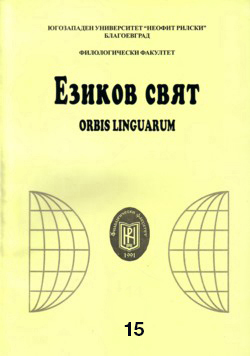НАЧИНИ ЗА ИЗРАЗЯВАНЕ НА МИНАЛО РЕЗУЛТАТИВНО ВРЕМЕ В БЪЛГАРСКИТЕ ДИАЛЕКТИ
DIFFERENT WAYS OF EXPRESSING PERFECT TENSE IN THE BULGARIAN DIALECTS
Author(s): Vladislav MarinovSubject(s): Language studies, Language and Literature Studies, Theoretical Linguistics, Applied Linguistics, South Slavic Languages, Philology
Published by: ЮГОЗАПАДЕН УНИВЕРСИТЕТ »НЕОФИТ РИЛСКИ«
Keywords: past perfect tense; Bulgarian dialects; Slavic model; Roman model
Summary/Abstract: In the article are presented the different ways of expressing past perfect tense on the territory of the Bulgarian language territory. The two main constructions are: “to have” + “past passive participle” and “to be” + “past active participle”. A hybrid construction such as: “to be” + “past passive participle” appears in some of the dialects as well. The emphasis falls on dialects with two or more models of expressing past perfect tense. A general review of the theoretical foundations is made that is connected to the semantics of the past perfect tense.
Journal: Езиков свят - Orbis Linguarum
- Issue Year: 2017
- Issue No: 1
- Page Range: 30-37
- Page Count: 8
- Language: Bulgarian

